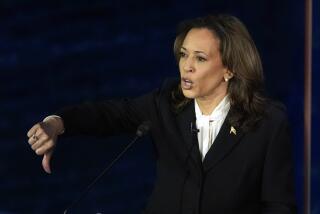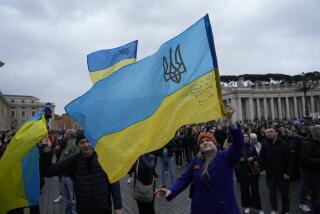Pope’s Visit Gives Many Poles a Lift, but Dispirited Mood Seems a Chronic Malady
WARSAW — When John Paul II made his first papal pilgrimage to his native land in 1979, it was a welcome home for a national hero, the first Polish Pope, and a moment of pride for Poland. At least that’s what it started out to be. But in the process the population discovered something else.
“It discovered itself,” a Pole said last week, fondly remembering the time. “Poland went out in the millions and found there was a ‘we’ here.”
That discovery, Poles generally agree, awakened the spirit that led finally to the formation of Solidarity, the independent trade union movement that burst forth a year later to mount the most serious challenge to the Communist system in Poland since its inception at the end of World War II.
Now, in the aftermath of the Pope’s third trip home, which ended Sunday, Poles are assessing his most recent visit in a different light. Solidarity, many agree, seems all but dead, officially outlawed and harassed, its printing presses underground, its factory organizers operating in secret if at all.
Martial law has come and gone, the Solidarity era’s political prisoners are freed from jail and a new collection of officials is in charge at the top. But the system that Solidarity and its allies hoped to alter is still very much in place.
The economy is in grim straits and shows no immediate sign of improving. Poles, absorbed with the increasingly difficult concerns of daily life--standing in line to buy meat or cheese or shoes--suggest with their stooped shoulders and blank expressions the dispirited mood that seems widespread in the country.
The Pope’s latest visit provided a momentary lift for many people here, but it is not at all certain that it will inspire any enduring relief from the enervating depression that many Polish observers say has settled in like a chronic malady.
“The Pope certainly left people with a sense of pride, but at the same time I’m rather pessimistic,” said Prof. Klemens Szaniawski of Warsaw University. “What we now need most is some kind of a social contract between the government and the people, some kind of understanding, and I see no evidence that this is forthcoming.
“My own best hopes were shattered, because I had hoped that the Pope might act as a kind of mediator between the government and the people.”
Indeed, many opposition figures in Poland worried that John Paul’s visit, described by the Vatican in advance as a trip focusing mainly on religious concerns, would turn out to be a boost for the Polish government of Gen. Wojciech Jaruzelski.
“We thought there was a possibility,” one opposition figure said, “that the Pope’s visit might turn out to be a sort of endorsement for the government--not legitimizing it, necessarily, but acknowledging it. We feared that perhaps by seeing the Pope stand beside Jaruzelski, the people would say, well, he doesn’t like them, perhaps, but he accepts them.”
Locked Horns Immediately
But the Pope and the government locked horns almost immediately as the pontiff, in his first statement after a meeting with Jaruzelski, placed clear emphasis on his concern for human rights.
The Pope continued to press this theme in visits to eight cities over the next six days. His message, irritating for the government, reached its peak at Gdansk, Solidarity’s birthplace on the Baltic seacoast, where he repeatedly endorsed the movement’s ideals.
The gathering force of the Pope’s words inspired what seemed to be an urgent and unscheduled meeting between the Pope and two top emissaries of the government.
There is no official version of what passed at the brief meeting, held in Czestochowa the morning after the Pope’s journey to Gdansk, but sources say the government officials made two points: that the Soviet Union was watching the events with displeasure and that the Polish government was disappointed that the Pope had not found anything more positive to say about the government’s efforts at reform or its conciliatory moves regarding the Polish church.
The government officials also requested a final meeting between the Pope and Jaruzelski.
The meeting took place at the Warsaw airport, before the Pope’s departure, and it seemed obvious to Poles watching the event on television that Jaruzelski left the meeting, as one Solidarity supporter said, “with steam coming out of his ears.”
In his final public statement with the Pope, Jaruzelski said: “His Holiness will soon leave the fatherland. He’ll take its picture in his heart, but he can’t take its real problems. . . . It has to meet its own challenges.”
The Pope responded with yet another reference to human rights: “Our homeland must strive so that human life in Poland becomes more and more humane and worthy of man.”
Solidarity’s leadership issued a statement describing the Pope’s visit as a “source of inspiration.”
The government, by contrast, seemed more at a loss to characterize the papal visit, except to say that it “confirmed Poland’s internal stability and strengthened her international position.” It could not say, as it had clearly hoped, that the Pope had endorsed its program of “national reconciliation,” a theme Jaruzelski sounded in the hope of reuniting the country after the upheaval brought about by Solidarity and two years of martial law.
Opposition forces were heartened also by the Pope’s repeated support for activism in the Polish church. John Paul’s frequent mention of the slain pro-Solidarity priest, Father Jerzy Popieluszko, as a standard to which young priests should aspire was regarded as a reversal for the policies of the Polish primate, Cardinal Jozef Glemp.
Glemp, viewed as a conservative force in the Polish church, has discouraged the involvement of priests in activities that could be seen as anti-government.
“The Pope’s stand was a message to Glemp,” said Father Stanislaw Malkowski, one of the priests at the Warsaw church where Popieluszko preached and is now buried. “The question is, will Glemp listen?”
Malkowski said Warsaw bishops suggested recently that personnel at the church might soon be reorganized. He said he feared that he and other priests might be reassigned and that the shrine to Popieluszko “might be dismantled, step by step.”
“These people (Cardinal Glemp and the bishops) are affected by pressure,” he said. “There is some kind of pressure from the Pope. But the Pope is far away, and the regime is near.”
Another Solidarity activist said: “This is not the first time that there has been a difference between the Pope and the church hierarchy here. The Pope sent clear signals before that he was watching and interested in what Popieluszko was doing and was his protector against local church officials.
“Now, the Pope has sanctioned Popieluszko again. Young clerics have an example, described by the Pope, of how to be a successful priest, a national hero, and to find their way to the hearts and minds of the people. The Pope had a message for the bishops as well. He told them they must ‘be with the people.’ ”
Not Easily Overcome
But Father Malkowski, Prof. Szaniawski and other sources said they believe that the general depression felt by most of the population will not be overcome easily.
“The Pope does for us what he can,” Malkowski said, “but it is a fact that his power is limited.”
Szaniawski said the pessimism in the country had caused people to turn inward, focusing on immediate and personal concerns.
“People don’t care about doing their regular work,” he said. “They’re just concerned about where they might make some extra money, where they can find some scarce item. They’ve given up hope of any real change. They mark time and try to get by.”
Marcin Krol, editor of a new independent magazine, launched after a two-year struggle, expressed optimism about the situation.
“The welfare state is no longer the welfare state,” he said. “This is a time of big changes. The system is heading for a collapse. The authorities can deal with this in two ways. They can send police into the streets, or they can allow the people to do things for themselves.
“They won’t ever accept it generally, but they will have to see it. It’s changing socialism without changing its name. So maybe that is optimism.”
More to Read
Sign up for Essential California
The most important California stories and recommendations in your inbox every morning.
You may occasionally receive promotional content from the Los Angeles Times.










